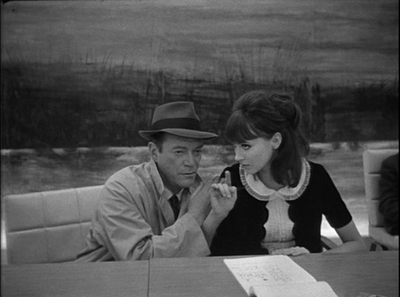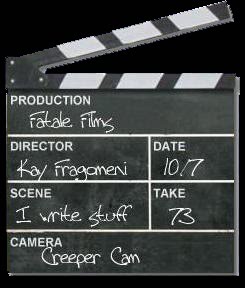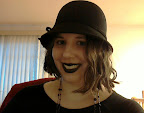So, to do something I have actually done already at the very beginning of my time limit, let's take about French sci-fi! I present, Jean-Luc Godard's Alphaville: Une étrange aventure de Lemmy Caution or just Alphaville to most people.

Before I give a film history lesson, I want to mention how I decided to watch this movie. Two years ago I was reading After Dark by Haruki Murakami (for fun, not my minor and I still don't know how I feel about Murakami but I loved this book). In the book, the main character is asked to go to a love hotel to translate the testimony of a battered Chinese prostitute who was essentially left there to die so the employees can help her. The love hotel was called "Alphaville", a joke that was not lost on the main character who explained that it was a French film about a community that is not allowed to have emotion and that it's a fitting name for a place where people go to have meaningless sex. Right after, I watched the movie.
Now the director's name is probably somewhat familiar to film people as he was the director of À bout de souffle ("at breath's end") or Breathless as it's know outside of French places. This movie is often seen as the defining movie of the French New Wave using hand held cameras, no lighting, and lots of improv. I saw it before this one and honestly? I liked this movie better. Sure, it's not as "culturally significant" and the idea has been done before in many ways but I just enjoyed it more. And I have seen other New Wave era films that I actually enjoyed slightly more than Breathless.
So, I mentioned the idea has been done before? Orwell's 1984 and Bradbury's Fahrenheit 451 were both published before this movie was made and they both focus on a dystropia where emotions aren't really allowed. There were also plenty of movies and books after this film with that theme. Ever see Equilibrium?

Christian Bale does not understand the power of a cute puppy.
So what makes this movie unique? For one thing, the main character is not a member of the society who rejects it but a secret agent from outside the society going into it on a mission. He is constantly noting how strange Alphaville is in the way the audience is doing.
Another thing about this movie that is fairly contrary to most media about these emotion-free dystropias is the presence of sex. Alphaville does not treat sex in the same way as other medias do: as simply a means of reproduction. In Alphaville, a community that thrives on science and logic, a need for sex is seen as nature and not emotion and therefore, is okay. In the beginning of the movie when Lemmy arrives in his hotel in Alphaville, the women who showed him to his room, Beatrice, a "third class seductress," offers to bathe with him. These seductresses are commonplace.
The last thing that really sticks out about this movie is the setting. It is set in something of an alternative present. Everything looks like the 60s, there are no strange sets or effects, and it is clear that the world is not Alphaville and that this is just a small community that for the most part, looks the same as everywhere else. It is the attitudes and behaviors that are different.
So anyway, let's get into plot.
Lemmy Caution arrives in Alphaville, checks into a hotel and is taken to his room by the aforementioned third class seductress Beatrice. Nothing strikes him as particularly strange until he hears that each room has a Bible. When he asks her about it, she casually replies that they do believe in it and then mentions that there are tranquilizers in the bathroom, presumably the way they are able to remain so calm. She offers to bathe with him and he is attacked by a man hiding in his bathroom. He gets him out and Beatrice doesn't react at all to the incident.
Lemmy takes a picture of her since he has decided to photograph things he finds strange there, kicks her out, and then reveals that his purpose in Alphaville is to find a missing agent, Henry Dickson, and kill or capture the creator of Alphaville, Leonard Von Braun.
Natasha Von Braun, his daughter, comes to his room as she is the one with the job of showing around people from the Outlands. Lemmy compares her to a vampire, not an inaccurate comparison if you are thinking of the stunning emotionlessness of "Twilight" vampires. She talks about a festival that is coming to a close and they chat about things she doesn't understand.
I should point out that the movie has two narrators, one being Lemmy and the other being Alpha 60, a powerful machine that seems to function as an all-seeing eye around the city and sounds like a frog with a sore throat who has learned to speak. Alpha 60 alerts him of Natasha's arrival and waxes poetic on the danger of emotion.
In keeping with the ideas of science, all the places have names that honor science and math. Lemmy in particular is trying to get to "12, Enrico Fermi" (which happened to be the person my high school was named after).
While she is giving him a ride, she insists that he must check in at Residential Control and he says he will eventually and asks if he can meet her father. She says she has never met him but will try to arrange a meeting.
When Lemmy finds Henry Dickson he finds that Dickson has been somewhat brainwashed by the society he was sent to destroy as he had first been given the assignment of killing Dr. Von Braun. Dickson explains the town and Alpha 60 to him. To quote Wikipedia (as I am lazy), "Alpha 60 outlaws free thought and individualist concepts like love, poetry, and emotion in the city, replacing them with contradictory concepts or eliminating them altogether. One of Alpha 60's dictates is that "people should not ask 'why', but only say 'because'." People who show signs of emotion (weeping at the death of a wife, or a smile on the face) are presumed to be acting illogically, and are gathered up, interrogated, and executed." It is for this reason that people routinely ask Dickson to kill himself as he cannot assimilate fully.
The conversation between Lemmy and Dickson is interrupted when a seductress Dickson ordered entered and he ends up dying in the middle of sex. This is apparently common for the French.
He goes to visit Natasha at work where she is a programmer of Alpha 60 who repeats a lot of ideas that symbolize the society while they work.
Also, I want her outfit. I apologize for the emotional outburst.
Programming is very different in Alphaville. Why are women's eyes "yes" and men's eyes "no"? The differences between the sexes will come up again soon.
Lemmy admits that he doesn't understand any of Alpha 60's rantings. She explains to him how life and death are part of one continuous cycle and are meaningless and he says, "This dump of yours isn't Alphaville; it's Zeroville."
Lemmy takes a picture.
It's interesting how this women, in her choice of styling, appears to be flaunting her number, instead of simply concealing it by brushing her bangs in the opposite direction. A sense of pride in being a part of Alphaville, perhaps?
Natasha takes him to a government building where Von Braun is supposed to be and they witness the executions spoken of by Dickson.
I cannot help but wonder if this is supposed to be an insult saying that women lack emotion or a comment that women are more logical than men who are prone to behaving illogically.
It brings me back to the programming picture. Is the way a women views the world supposed to be preferred in Alphaville and that is why in the programming picture her eyes have been replaced with the word "yes"? It boggles the mind.
The first man they witness dying is guilty of the crime of crying when his wife died. He walks down a diving board, is shot executioner-style and then fished out of the water by women who resemble synchronized swimmers. The two men they witness the deaths of speak about the value of emotion and the cruelty of this city as their last words.
On the way out, Lemmy kidnaps Von Braun for a second before being captured by his body guards and beat up. Natasha cries for him but when they ask her if she is, she says, "No, it's forbidden."
The tears of foreshadowing.
Lemmy is interrogated by Alpha 60 about his purpose, name, age, etc. The machine suspects him of hiding things but does not know what so he lets him go. Lemmy ends up talking to a doctor who informs him that this building is the heart of Alpha 60 and that Professor Von Braun was once Professor Nosferatu and was expelled from the Outlands in 1964.
They show him around the building (the above is the Central Interrogation Station) and say that he could provide them with knowledge of what the Outlands are doing wrong, as they have just gone to war with them, and ask him why he shot the man hiding in his bathroom in the beginning (which was apparently a "Welcome to Alphaville!" test).
Alphaville is full of things like this, spiral staircases, straight lines, etc.
Lemmy leaves and proves that he has done his research on Alphaville. Apparently in the beginning those who could not assimilate were so plentiful, they were put in a theater and electrocuted while watching a show. The chairs were designed to dump the bodies afterwards Sweeney Todd style and then then another batch was allowed in. Stuff of nightmares. Also, apparently Germans, Swedes, and Americans were the best at assimilating. *insert joke about their emotionlessness here?*
He goes back to his hotel and Natasha is there hiding. She shows him the number on her neck called a control number. He shows her a book called "The Capital of Pain" full of words she has never heard before like "pain", "despair", and "conscience."
She goes to grab the Bible to look up the word, now making it clear that the Bible is actually a dictionary without any words that may provoke emotion. She actually seems a little sad that no one knows the meaning of the word "conscience" including herself. Recently "tenderness" and "autumn light" have been removed.
Lemmy, knowing Von Braun's history, proves to Natasha that she does remember things of the Outlands where she was born including descriptions of Tokyo, Florence, and New York.
Starting to remember, she decides that she wants to leave Alphaville but is afraid.
He tells her that he loves her and she initially does not understand but it intuitively clicks with her as she feels the same way.
Alpha 60, knowing everything, sends the police to capture Lemmy. Natasha admits that she will betray him and does so by telling a joke, causing him to laugh and therefore warrant arrest.
He goes before Alpha 60 again. He criticizes the machine and it condemns him to death. He responses logically by running away, shooting people, and getting a cop to drive him to Professor Von Braun.
Lemmy asks Von Braun to come with him to the Outlands and Von Braun asks him to say there. Lemmy shoots him. Guns solve all problems in this movie.
Alpha Cam!
Lemmy goes to get Natasha, who appears to have been experimented on by the government but the mention of love wakes her up somewhat from her drunken stumbling as they make their escape to the Outlands, having destroyed the system.
As they drive away, Natasha senses that Lemmy wants her to say something to him and asks him what but he tells her she must figure it out on her own. After some thinking she arrives at the conclusion:
"I love you."
Fin.
Allow me to share an unpopular opinion: crazy executions aside, I kind of like the basic idea behind the city of Alphaville. I would kind of love to live in a place primarily dictated by logic and, as a lot of people who know me would claim, I having trouble expressing emotion in kind of the same way Natasha does. Of course, a world of no emotion would be bad but I do believe the world could always use more logic.
Anyway, I like this movie a lot. There's a lot of New Wave directing moments which people are usually divided on but the actual plot is very palatable to any sci-fi fan.
Logic dictates that you should give it a try.























































